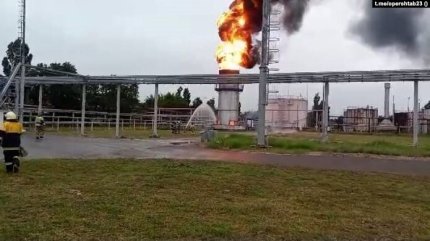According to RosZMI, the aggressor country is experiencing a record rise in gasoline prices over the past 13 years amid attacks by Ukrainian drones on Russian refineries.
Points of attention
- Ukrainian drone attacks on Russian refineries have caused a record increase in fuel prices in Russia, reaching the highest levels in 13 years.
- The Russian government imposed a ban on fuel exports to contain prices after attacks on refineries, leading to further price hikes and inflation.
- Forecasts suggest that fuel prices in Russia may continue to rise by 10-15% in 2025, or even up to 20% under extremely unfavorable conditions, due to various factors such as transportation tariffs and ruble devaluation.
- The impact of the record increase in fuel prices in Russia is not limited to the fuel sector but may also affect the prices of other goods and services due to the cost of delivery.
- Gasoline prices in Russia rose by 11% as of December 23, 2024, with an average of 60.57 rubles per liter, marking the largest increase since 2011.
How Ukrainian drone attacks on Russian refineries led to a record increase in gasoline prices in the aggressor country
It is noted that as a result of the recent attacks by Ukrainian UAVs on Russian refineries in the aggressor country, fuel production volumes decreased by more than 10% during the first half of 2024 alone.
According to Rosstat, as of December 23, gasoline prices in the aggressor country had increased by 11%. On average, they reached 60.57 rubles per liter.
In remote regions, such as the Far East, prices exceed the average level by a quarter.

This is the largest price increase since 2011, when gasoline prices skyrocketed by 14.9%.
Compared to 2024, gasoline prices increased by 7.2% in 2023, by only 0.9% in 2022, and by 8.9% in 2021.
For the first time in six years, gasoline prices are rising faster than overall inflation, which, according to estimates by the Ministry of Economic Development of the Russian Federation, will be 9.7%.
According to analysts, this could trigger a further increase in prices for all other goods, since the price of fuel is included in the cost of delivery.
To contain prices, the Russian government imposed a ban on gasoline exports after attacks on refineries.
By the end of May, the decline in fuel production reached 20% compared to December 2023. At the same time, production statistics were classified under the pretext of "geopolitics".
What could be the increase in fuel prices in the aggressor country in 2025?
According to analysts' forecasts, in 2025, a further increase in gasoline prices is expected within 10-15%, and in the case of extremely unfavorable conditions — up to 20%.
Among the likely reasons are increased transportation tariffs, increased excise taxes, and the impact of the ruble devaluation.




